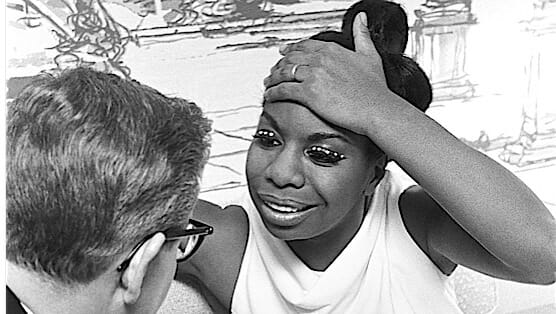
The exceptional and the conventional do battle in What Happened, Miss Simone?, a thoughtful, admiring look at the gigantically talented singer and artist Nina Simone. Directed by veteran documentarian Liz Garbus (Oscar-nominated for co-directing The Farm: Angola, USA), the film seeks to showcase Simone in all her complexity—civil rights icon, trailblazing jazz musician, a victim of mental illness—and there’s no questioning the love that flows through every frame. And yet, Miss Simone? is disappointingly safe in its approach. Oddly, the reverence Garbus shows Simone does her subject a disservice: The straightforward structure diminishes the singer’s rebellious genius.
Miss Simone? begins intriguingly, showing footage of Simone in concert in 1976, her attitude almost antagonistic as she approaches the piano to start the show. That iron will, that dedication to her art above all else, is an important jumping-off point for the film, which soon goes back to her early days. Born in 1933 as Eunice Waymon in North Carolina, Simone soon becomes entranced by music, whether at church or in her classical piano lessons as she learns about figures like Bach. Working from archival photos and Simone’s own interviews, Miss Simone? gives us the sense of a young woman finding herself through song, digging into blues and jazz and harnessing a voice that’s astoundingly expressive, suggesting vulnerability and rugged toughness with equal skill.
But because of Simone’s race, her career was never going to be easy. Garbus illustrates how the singer’s ascension collided with the civil rights era of the 1960s, a movement she embraced. Closer in temperament to Malcolm X than Martin Luther King Jr.—although she respected both men’s message—Simone welcomed her image as a firebrand, covering the anti-racism classic “Strange Fruit” and writing “Mississippi Goddam,” a song protesting (in part) the 1964 Birmingham church bombing that left four girls dead.
Without dime-store psychoanalyzing Simone’s inner drive, Garbus does hint that perhaps Simone’s resilience in the face of criticism—her skyrocketing career suffered because of her ’60s political stances—came from an early age, when she would be ridiculed for her wide nose and large lips. Miss Simone? makes the case that Simone would have spoken her mind no matter what era, but that the African-American struggle for equality was a particularly fertile catalyst for her talent and her outspokenness.
As a Simone primer, Garbus’s documentary has its values. Beyond simply tracking her career highlights, Miss Simone? also traces her abusive relationship with her husband and manager, Andrew Stroud, as well as detailing her exodus to Liberia in the mid-1970s—not to mention her further decline as her fame diminished and her bipolar condition worsened. But Miss Simone? only occasionally reflects the fire and chaos that marked Simone’s life. (She died in 2003 at the age of 70.)
Weaving together news clips, interviews with (among others) Simone’s daughter and her longtime guitarist, and concert footage, the documentary has the unfortunate habit of making history seem a bit staid. This is all the more surprising considering how despairingly timely Miss Simone? is. At a moment in U.S. history when racial tensions are front-page news because of police shootings in places like Ferguson—and when a recent movie, Selma, can remind us of how far we still have to go to erase divisions between groups—the political turmoil that ensnared Simone couldn’t be more relevant or stinging. Miss Simone? instead settles for a traditional rise-then-fall-then-rise-again narrative that, although accurate to Simone’s career and life trajectory, can’t help but feel routine. It also doesn’t help that the movie’s interview subjects don’t have much insightful to say about what specifically made her such a musical titan.
Then again, maybe they don’t need to. Miss Simone?’s highlight is the scenes of Simone on stage: fiery, mournful, transcendent, sometimes combative. (A great moment comes when she stops performing mid-song to admonish an offscreen audience member for getting out of his or her seat.) In these brief glimpses, taken from across her career, we see a woman flower and then harden, circumstances intervening to inform and sometimes impair her talent. We’re really—finally—seeing Simone in all her glory and complexity. What Happened, Miss Simone? is about a singular, uncompromising artist who took immense risks—not always successfully, but in such a way that she was an undeniable force. The documentary chronicles that electricity, but it doesn’t always feel energized by it.
Director: Liz Garbus
Release Date: Screening at the 2015 Sundance Film Festival
Tim Grierson is chief film critic for Paste and the vice president of the Los Angeles Film Critics Association. You can follow him on Twitter.